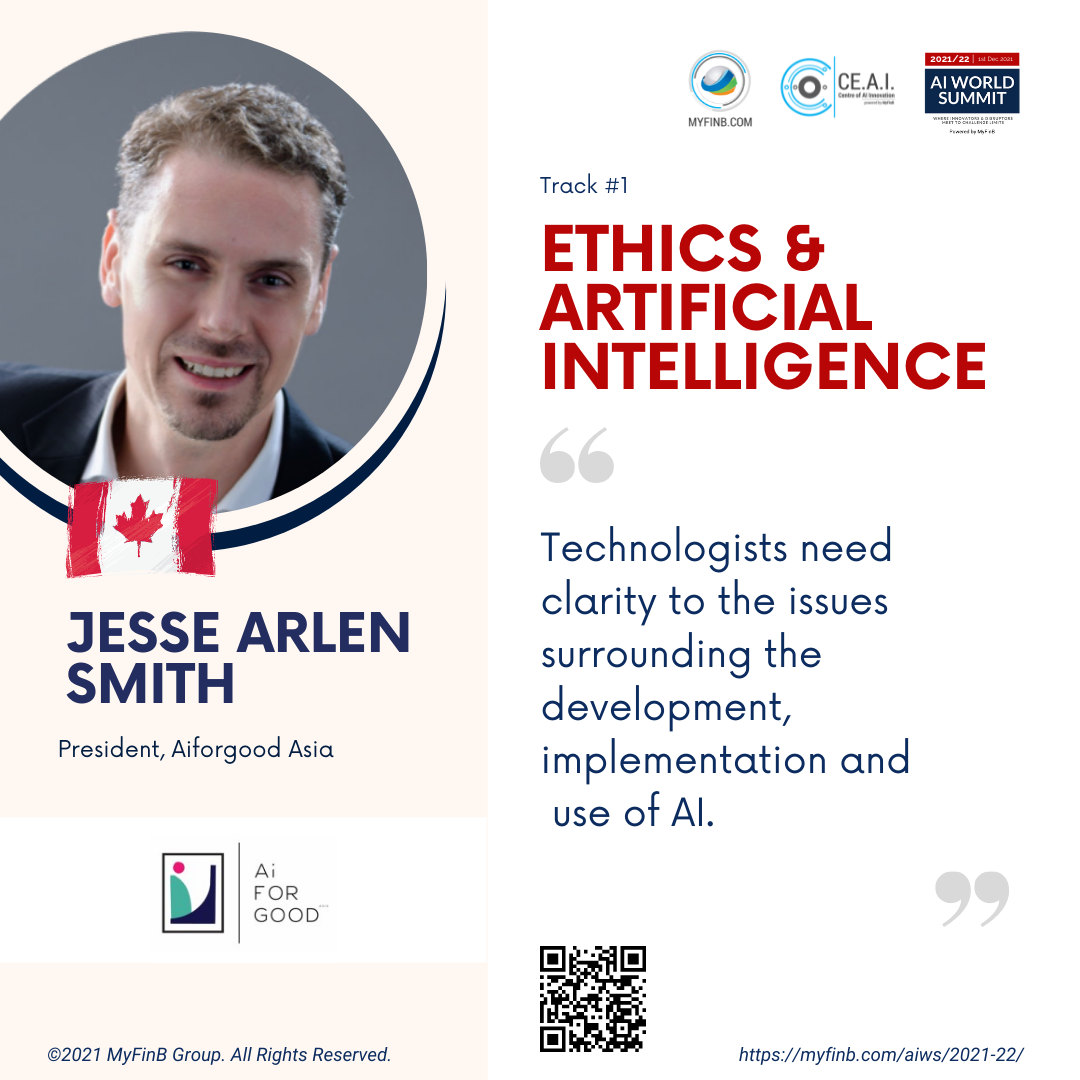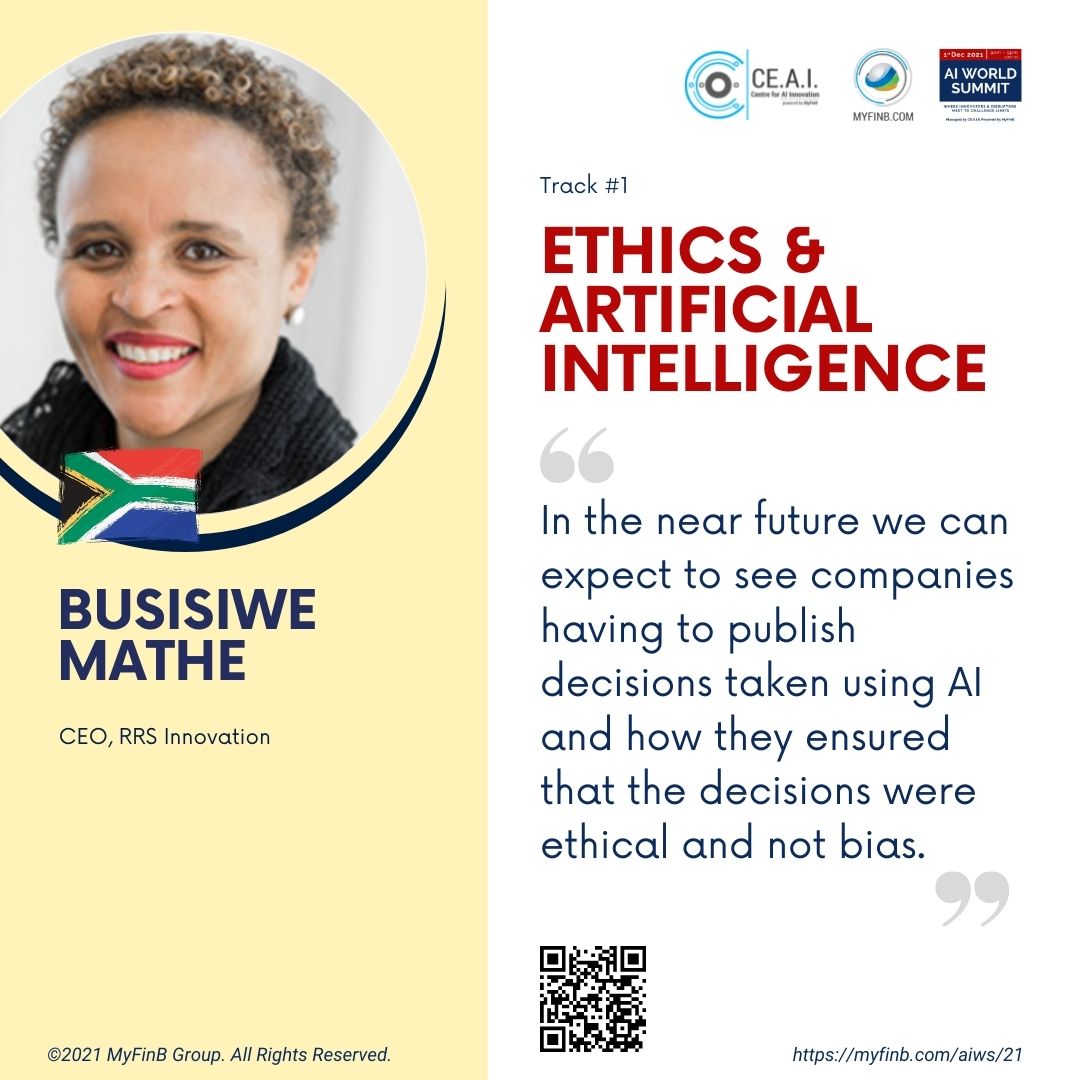AIWS'21 // Track #1
#1 - Ethics & Artificial Intelligence

Key discussion points
- To what extent is bias a major problem in today’s AI systems? What effect is that bias having?
- Companies need to commit to “creating and implementing AI responsibly and ethically.” How is this process evolving?
- What are steps that companies can take to improve the ethical foundation in their AI systems?
- The future: If we look several years ahead, what can we expect to see for the future of AI and ethics?
As artificial intelligence plays an ever greater role in our world, the question of ethics in our use of AI gains greater urgency.
SPEAKERS & SAYS
Stay tuned. More speakers are sharing their perspective soon.

1. To what extent is bias a major problem in today’s AI systems? What effect is that bias having?
Although often unintentional, algorithmic bias often comes from training data due to historical inequality of human experts, when the data is not representative of the actual population, or from improper selection of a combination of features. The problem of bias can be prevented by the operationalization of principles such as fairness and justice. Analyzing the training data with these principles within a process framework can prevent these unwanted consequences.
2. Companies need to commit to “creating and implementing AI responsibly and ethically.” How is this process evolving?
The recent rise of Artificial Intelligence technologies has sparked a proliferation of policies and practices intended to ensure the ethical development of Artificial Intelligence. However the variety of different ethical issues and potential outcomes of AI have led to an extensive yet somewhat ill-defined discourse surrounding the implementation of ethical guidelines. This discourse has left AI technologists with a lack of clarity over ethics and its relation to AI technologies. To counter this phenomenon, technologists will need clarity to the issues surrounding the development, implementation and use of AI, by categorising these issues as outcomes and linking them to specific ethical principles that can be operationalized.
3. What are steps that companies can take to improve the ethical foundation in their AI systems?
First companies will need to have a clear understanding of the ethical principles that need to be upheld, then it will be necessary for them to have a systematic way to translate theory into practice. At Aiforgood Asia we call this “ethics as a service”. This is the process of operationalizing ethics into all the different phases of development and implementation from how the technologies are designed, where they are deployed, who they are sold to; and how they are applied. Companies can start by establishing an independent multi-disciplinary ethics board to oversee the implementation and distribute responsibility throughout all levels of the organization and then ensure the enforcement of selected processes and tools.
4. The future: If we look several years ahead, what can we expect to see for the future of AI and ethics?
As the public becomes more increasingly aware of the potential negative outcomes that can arise when ethical principles are not implemented in AI design, we will see a variety of Companies respond. Some will create ethics boards, and hire ethics and compliance officers. Unfortunately, most of these efforts will not be effective, as industries and companies try to get ahead of policy governance. This flood of ethics “Bluewashing” are essentially public relations exercises that serve to distract consumers from the ethical damage the companies are causing. An example of this is when academia and academic research on AI ethics are used to lend credibility to the tech industry, which lobbies hard to avoid restrictive legal regulations. I worry that these tactics will water-down the effectiveness of implementing ethics and confuse the public if people are not more aware of this practice.
– Jesse Arlen Smith – President, Aiforgood Asia

1. To what extent is bias a major problem in today’s AI systems? What effect is that bias having?
Companies are adopting and utilising AI in decision making (such as hiring, advertising, which products to sell, investments etc) and these systems can run the risk of being bias emanating from unrepresentative or incomplete data or reliance on flawed information that reflects historic inequalities. We have read in the past of a number of bias algorithms in AI from; the amazon online recruiting tool, facial recognition technologies to bias in word association. This bias has a great effect on humans and companies, as it can impact and affect them negatively if not dealt with.
2. Companies need to commit to “creating and implementing AI responsibly and ethically.” How is this process evolving?
In order for companies to commit to creating and implementing AI responsibly and ethically they need to build high-quality, transparent, explainable and ethical AI applications that generate trust and inspire confidence among employees, customers, business partners and any other stakeholders.
3. What are steps that companies can take to improve the ethical foundation in their AI systems?
Companies can first start by implementing a framework that addresses the risks associated with using AI risks such as; performance, security, control, economic, societal and ethical risks etc. A framework that encompassed fundamental elements of:
i) Governance – anchored on your organisations core values, ethical guardrails and regulatory constraints.
ii) Design – any new solution should be architected and deployed with trust built into the design, meaning requirements for privacy, transparency and security are baked into the new product features. AI solutions that can explain their rational for decision making.
iii) Monitoring – Close supervision using ongoing human monitoring and auditing of the performance of algorithms against key value-driven metrics of accountability, bias and cybersecurity.
iv)Training – Prepare and equip employees to take full advantage of AI and the new work styles that it fosters. Educate employees on how AI is integrated into operations, engage them in co-creation etc.
4. The future: If we look several years ahead, what can we expect to see for the future of AI and ethics?
Given the rise in the use of AI especially in recent years, questions around ethics are becoming very important and require to be answered by any company utilising AI in decision making. In the near future we can expect to see companies having to publish decisions taken using AI and how they ensured that the decisions were ethical and not bias. We might also see a rise in legislation around responsible AI and how companies might be required to declare this periodically to a regulator.
– Busisiwe Mathe – CEO, RRS Innovation
